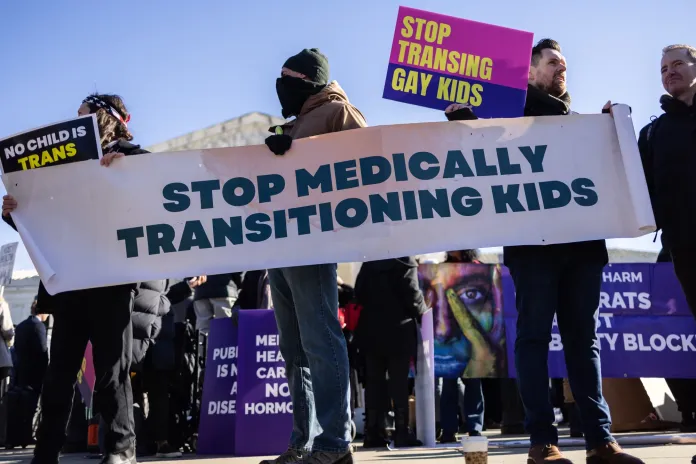Three separate Supreme Court petitions involving various school districts across the country asked the nation’s highest court to weigh in on whether schools can transition students without parental knowledge or consent.
In Littlejohn v. Leon County School Board, plaintiffs January and Jeffrey Littlejohn say the Florida school district devised a secret “gender support” plan for their 13-year-old daughter, who had learning difficulties, developmental delays, and deteriorating mental health.
According to the family’s petition for a writ of certiorari, school officials secretly met with the middle schooler and drafted a detailed plan for her “formal gender transition at school,” pursuant to district policy, which directs staff “not to notify parents.”
In accordance with the district’s LGBTQ+ Support Guide, all teachers were required to use “they/them” pronouns when referring to the teenager, and the school updated its internal records to reflect this “nonbinary” identity.
FLORIDA PARENTS SUE AFTER SCHOOL CLANDESTINELY ORCHESTRATED DAUGHTER’S GENDER TRANSITION
In Foote v. Ludlow School Committee, petitioners Stephen Foote and Marissa Silvestri instructed a Massachusetts middle school multiple times not to interfere with the mental healthcare plan they had in place for their gender-confused daughter.
But over these objections, the school administration, following district protocol, facilitated the sixth grader’s in-school gender transition behind their backs, Foote and Silvestri told the Supreme Court.
Unbeknownst to them, school personnel conducted private counseling sessions with the 11-year-old, whom they treated as “genderqueer,” and she was allowed to access opposite-sex facilities, such as the boys’ bathroom.
In Lee, et al. v. Poudre School District, two Colorado couples, Jonathan and Erin Lee alongside Nicolas and Linnaea Jurich, say their daughters attended Gender and Sexualities Alliance meetings at Wellington Middle School, where prizes were provided to children who “came out” as transgender.
The “seeds of distrust were planted” against parents during these after-school GSA activities, according to a 301-page petition filed by the Lees and Juriches. Both girls were told to keep club conversations confidential because their parents may not be “trustworthy” to talk about gender identity with.
PARENTS ARE FED UP WITH PUBLIC SCHOOLS SECRETLY TRANSITIONING CHILDREN
At the crux of each case, all backed by parental rights groups, is a constitutional question concerning the fundamental rights of parents to be fully informed about the well-being of their children while they are in the care of public school programming.
Late last year, the Supreme Court declined to take up a similar challenge in Parents Protecting Our Children v. Eau Claire Area School District.
Justices Samuel Alito, Brett Kavanaugh, and Clarence Thomas would have heard the Wisconsin case, but they were one vote short of what is needed for a full review.
In a dissenting opinion on the denial of certiorari, Alito said parent-exclusion policies present an issue “of great and growing national importance,” that is, whether public school districts violate parents’ constitutional right to make informed decisions regarding the rearing of their children when school staff, without parental awareness or permission, encourages a student to transition genders socially and even assists in that process.
“We are told that more than 1,000 districts have adopted such policies,” Alito added.
This time, parental rights advocates are hopeful the Supreme Court will accept at least one of the cases, if not all three, seeking certiorari.
The three of them could be consolidated, explained Erin Friday, an attorney and the president of Our Duty-USA, which filed amicus briefs supporting the Littlejohn and Foote appeals.
Friday, a licensed California lawyer, speculates that the Supreme Court could be building on case law by taking on transgender-related cases in a certain order, such as addressing the medical transitioning of minors in United States v. Skrmetti, so-called “conversion therapy” in Chiles v. Salazar, and sex-segregated school sports in Little v. Hecox, as well as West Virginia v. B.P.J.

“I think they’re doing it in order of which they think they can build on previous decisions,” Friday told the Washington Examiner.
Friday believes the matter of schools deliberately concealing social transitioning plans from parents is of interest to the Supreme Court, as this sort of school-sanctioned secrecy usurps parental authority.
“With all of these school cases, there is a presumption that the parents are dangerous,” she said. “That is the antithesis of law in the United States. Parents are presumed to love their children and have their best interest at heart. That’s part of our foundational documents.”
IDENTITY CRISIS: CALIFORNIA KEEPS PARENTS IN THE DARK ABOUT THEIR CHILDREN’S GENDER CONFUSION
Friday, whose own daughter started identifying as transgender around age 13 due to social influence, said these school concealment practices are based on the false premise that parents who believe in biological reality are “abusive” simply for not affirming their child’s chosen gender identity.
“The schools are going well beyond just accepting what a child says they want to be called,” Friday continued. “They are scaffolding gender identity, and they are hiding it from parents.”

